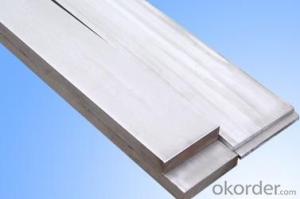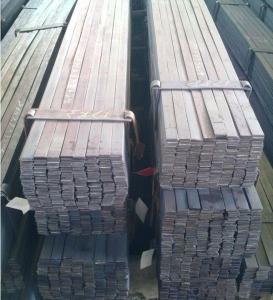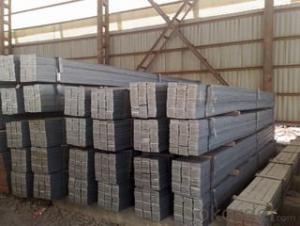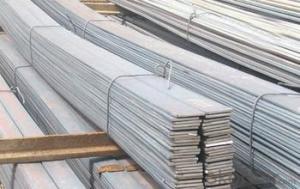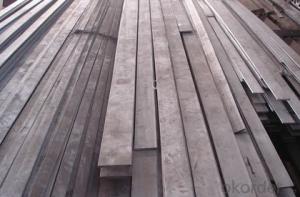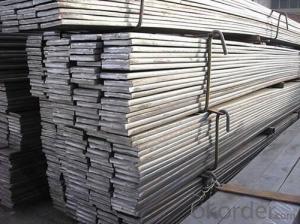Hot Rolled Grade ASTM A36 S235JR SS400 Steel Flat Bar Sizes
- Loading Port:
- Tianjin
- Payment Terms:
- TT or LC
- Min Order Qty:
- 3 m.t.
- Supply Capability:
- 10000 m.t./month
OKorder Service Pledge
OKorder Financial Service
You Might Also Like
Item specifice
Hot Rolled Grade ASTM A36_S235JR_SS400 Steel Flat Bar Sizes
Details of Hot Rolled Grade ASTM A36_S235JR_SS400 Steel Flat Bar Sizes
Name | Hot Rolled Grade ASTM A36_S235JR_SS400 Steel Flat Bar Sizes |
Shape | Flat Bar |
Standard | GB/ASTM/SAE/AISI/DIN/JIS/EN/BS |
Surface Treatment: | Black/Peeling/Polished/Machined |
Delivery Condition: | Hot Rolled or Forged/Peeled or Black Surface |
Test | SGS/UT 100% Elements Testing |
Certificate: | ISO/Mill Certificate |
Service: | 24 hours online service / |
more than 20 years trading and manufacture | |
Quality Assurance: | the third party inspection, such as SGS, BV, TUV…etc. is acceptable |
Packaging Details: | Seaworthy Packaging or as per customer's packing instruction |
steel flat bar grade | A36, Q235, Q195, SS400, St37-2 |
steel flat bar standard | GB, ASTM, AISI, EN, JIS |
steel flat bar thickness | 1.8mm-17.75mm |
steel flat bar width | 10mm-870mm |
steel flat bar length | 6m, 9m, 12m or as customer requirement |
steel flat bar technique | Slitting hot rolled steel coil |
Specification of Hot Rolled Grade ASTM A36_S235JR_SS400 Steel Flat Bar Sizes
Width | Thickness | Length | Theoretical Weight |
(mm) | (mm) | (m) | (kg/m) |
20 | 2 | 6/9/12 | 0.31 |
20 | 2.5 | 6/9/12 | 0.39 |
20 | 2.75 | 6/9/12 | 0.43 |
25 | 2.5 | 6/9/12 | 0.49 |
25 | 3.75 | 6/9/12 | 0.74 |
30 | 2.5 | 6/9/12 | 0.59 |
30 | 3.5 | 6/9/12 | 0.82 |
30 | 9.75 | 6/9/12 | 2.3 |
40 | 3.5 | 6/9/12 | 1.1 |
40 | 4.75 | 6/9/12 | 1.5 |
40 | 11.75 | 6/9/12 | 3.69 |
50 | 2.75 | 6/9/12 | 1.08 |
50 | 4.5 | 6/9/12 | 1.77 |
50 | 9.75 | 6/9/12 | 3.83 |
60 | 5.5 | 6/9/12 | 2.6 |
60 | 7.5 | 6/9/12 | 3.53 |
60 | 11.5 | 6/9/12 | 5.42 |
80 | 5.5 | 6/9/12 | 3.45 |
80 | 7.5 | 6/9/12 | 4.71 |
80 | 11.75 | 6/9/12 | 7.38 |
100 | 3.25 | 6/9/12 | 2.55 |
100 | 4.75 | 6/9/12 | 3.73 |
100 | 7.5 | 6/9/12 | 5.89 |
120 | 9.75 | 6/9/12 | 9.18 |
120 | 11.75 | 6/9/12 | 11.07 |
150 | 9.75 | 6/9/12 | 11.48 |
150 | 11.5 | 6/9/12 | 13.54 |
150 | 13.5 | 6/9/12 | 15.9 |
160 | 11.75 | 6/9/12 | 14.76 |
200 | 9.5 | 6/9/12 | 14.92 |
250 | 5.75 | 6/9/12 | 11.28 |
340 | 7.75 | 6/9/12 | 20.68 |
CNBM Introduction of Hot Rolled Grade ASTM A36_S235JR_SS400 Steel Flat Bar Sizes Supplier
CNBM International Corporation is the most import and export platform of CNBM group(China National Building Material Group Corporation) ,which is a state-owned enterprise, ranked in 270th of Fortune Global 500 in 2015.
With its advantages, CNBM International are mainly concentrate on Cement, Glass, Iron and Steel, Ceramics industries and devotes herself for supplying high quality series of refractories as well as technical consultancies and logistics solution.
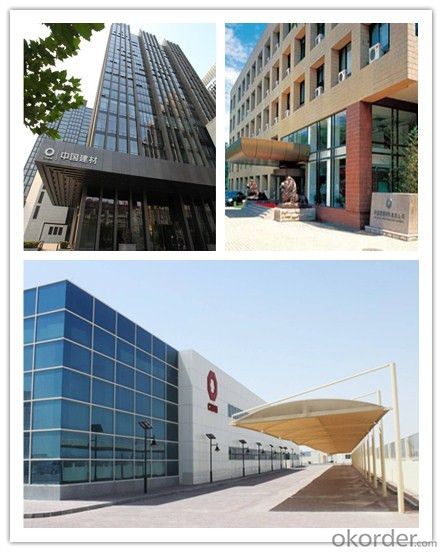
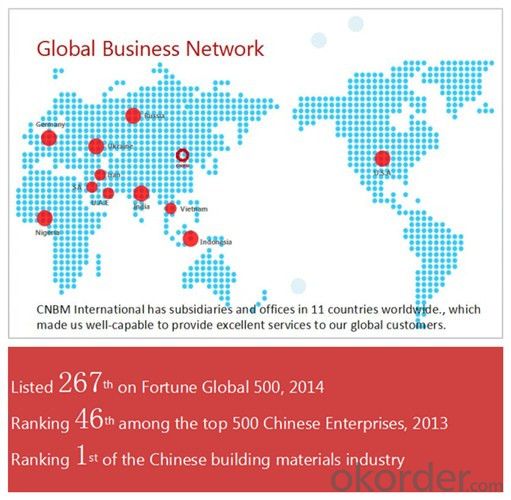
Packaging & Delivery Hot Rolled Grade ASTM A36_S235JR_SS400 Steel Flat Bar Sizes
Packaging Detail | Sea worthy packing /as per customer's packing instruction |
Delivery Detail | 15 ~ 40 days after receiving the deposit |
Products Show
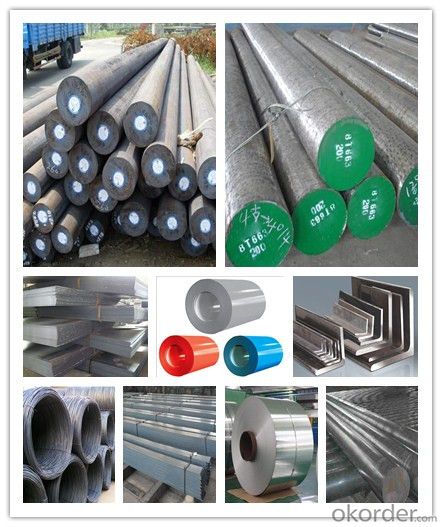
FAQ:
Are you a trading company or manufacturer? | Manufacturer |
What’s the MOQ? | 3 metric ton |
What’s your delivery time? | 15-35 days after downpayment received |
Do you Accept OEM service? | Yes |
what’s your delivery terms? | FOB/CFR/CIF |
What's the Payment Terms? | 30% as deposit,70% before shipment by T/T |
Western Union acceptable for small amount. | |
L/C acceptable for large amount. | |
Scrow ,Paybal,Alipay are also ok | |
Why choose us? | Chose happens because of quality, then price, We can give you both. Additionally, we can also offer professional products inquiry, products knowledge train (for agents), smooth goods delivery, excellent customer solution proposals. |
What's your available port of Shipment? | Main Port, China |
What’s your featured services? | Our service formula: good quality+ good price+ good service=customer's trust
|
Where are your Market? | Covering more than 160 countries in the world |
- Q:What are the challenges in welding special steel?
- One of the main challenges in welding special steel is its high carbon content, which can result in increased hardness and brittleness. This requires careful control of the welding process, including preheating and post-weld heat treatment, to prevent cracking and ensure proper weld strength. Additionally, special steels often have alloying elements that can influence the weldability, such as chromium, nickel, or molybdenum, requiring specific filler materials and welding techniques. Overall, the challenges in welding special steel lie in achieving a strong and defect-free weld while maintaining the desired mechanical properties of the steel.
- Q:What is the significance of carbon content in special steel?
- The carbon content in special steel is significant as it directly impacts the steel's strength, hardness, and overall performance. A higher carbon content typically results in a harder and stronger steel, making it suitable for applications that require durability and wear resistance, such as cutting tools or machinery components. On the other hand, a lower carbon content enhances the steel's toughness and ductility, making it more suitable for applications that require flexibility, such as structural components or automotive parts. Therefore, controlling the carbon content in special steel is crucial in tailoring its properties to meet specific industrial requirements.
- Q:What are the different surface modification techniques used for special steel?
- There are several surface modification techniques used for special steel to enhance its properties and improve its performance in specific applications. Some of the common techniques include: 1. Nitriding: Nitriding is a surface hardening process that involves the diffusion of nitrogen into the steel surface. It forms a hard layer of nitrides, which significantly increases the surface hardness, wear resistance, and fatigue strength of the steel. 2. Carbonitriding: Carbonitriding is a similar process to nitriding, but it involves the diffusion of both carbon and nitrogen into the steel surface. This technique increases the surface hardness and also improves the wear resistance and fatigue strength of the steel. 3. Case hardening: Case hardening involves the addition of a hard, wear-resistant layer to the surface of the steel. This can be achieved through processes like carburizing or carbonitriding, where carbon is introduced into the surface layer, transforming it into a high-carbon martensitic layer. 4. Shot peening: Shot peening is a technique that involves bombarding the steel surface with small, high-velocity shots of media, such as steel, ceramic, or glass beads. This process induces compressive stresses on the surface, improving its fatigue strength and resistance to stress corrosion cracking. 5. Electroplating: Electroplating is a common technique used to apply a thin layer of metal coating onto the steel surface. This can be done with various metals like zinc, nickel, or chromium, providing protection against corrosion, improving aesthetics, and enhancing wear resistance. 6. Physical vapor deposition (PVD): PVD is a coating technique that involves depositing thin layers of material onto the steel surface through a vacuum process. This technique can be used to apply coatings like titanium nitride (TiN), which provides excellent wear resistance and reduces friction. 7. Laser surface modification: Laser surface modification techniques, such as laser hardening or laser alloying, use a high-energy laser beam to selectively heat and modify the steel surface. This process can improve hardness, wear resistance, and corrosion resistance. These surface modification techniques can be tailored to meet specific requirements, enhancing the properties of special steel for various applications in industries such as automotive, aerospace, and tooling.
- Q:How does special steel contribute to the agriculture industry?
- Special steel plays a crucial role in the agriculture industry by providing durable and high-performance materials for various agricultural machinery and equipment. These steels are specifically designed to withstand the harsh conditions and heavy workloads encountered in farming operations, resulting in increased efficiency and productivity. One of the primary applications of special steel in agriculture is in the manufacturing of tillage equipment such as plows, cultivators, and harrows. These implements require robust materials that can withstand the abrasion and impact of soil and rocks. Special steel provides the necessary strength and hardness to ensure that these implements can effectively break up the soil, improve soil quality, and prepare the land for planting. Additionally, special steel is extensively used in the production of machinery for planting, harvesting, and processing agricultural products. For instance, combine harvesters, which are vital for large-scale crop harvesting, heavily rely on special steel components for their cutting systems, threshing mechanisms, and grain handling systems. By using special steel, these machines can efficiently handle the demanding tasks of crop collection, separation, and storage. Moreover, special steel contributes to the agriculture industry by enhancing the longevity and reliability of equipment. Agricultural machinery operates in challenging environments that expose them to corrosive elements, moisture, and extreme temperatures. Special steel, often coated with protective layers, offers resistance against corrosion, rust, and wear, ultimately extending the lifespan of agricultural equipment. Furthermore, the use of special steel in the manufacturing of machinery leads to improved precision and accuracy in agricultural operations. Modern farming techniques increasingly rely on precision agriculture, which involves using advanced technologies to optimize productivity, reduce waste, and conserve resources. Special steel components enable more precise movements, better control, and increased accuracy in machinery, leading to improved efficiency and minimizing waste. Overall, special steel is vital to the agriculture industry as it provides the necessary strength, durability, and precision required for various agricultural machinery and equipment. By utilizing these high-quality materials, farmers can enhance productivity, reduce downtime, and achieve sustainable farming practices.
- Q:Can special steel be used in the automotive parts manufacturing industry?
- Yes, special steel can be used in the automotive parts manufacturing industry. Special steel, such as high-strength, heat-resistant, or corrosion-resistant alloys, can provide enhanced durability, performance, and safety in automotive components like engine parts, suspension systems, and body structures. The use of special steel can improve the overall quality and longevity of automotive parts, ensuring better performance and reliability of vehicles.
- Q:How does special steel contribute to the agricultural industry?
- Special steel contributes to the agricultural industry by providing durable and high-performance materials that enhance the efficiency and productivity of agricultural machinery and equipment. It is used in the manufacturing of components like blades, cutting tools, plows, and harrows, which need to withstand tough conditions and heavy use. Special steel's strength, corrosion resistance, and ability to retain sharp edges make it ideal for these applications, ensuring longer lifespan, improved performance, and reduced maintenance costs for agricultural machinery.
- Q:What are the requirements for special steel used in battery technology?
- Special steel used in battery technology must meet several requirements to ensure optimal performance and safety. Firstly, high corrosion resistance is crucial as batteries often contain corrosive electrolytes that can degrade the steel over time. Special steel should possess excellent resistance to corrosion, preventing any chemical reactions that could compromise the battery's integrity and lifespan. Secondly, good mechanical strength is essential to withstand the internal pressures and external forces that batteries are subjected to during operation and handling. It must be able to resist deformation and maintain its structural integrity, even under high stress conditions. Thirdly, high thermal conductivity is desirable in special steel used in battery technology. Efficient heat dissipation is crucial for preventing overheating, which can reduce battery performance and potentially lead to safety hazards. Steel with good thermal conductivity allows for effective heat transfer, ensuring that the battery can operate within safe temperature limits. Additionally, the steel should have low electrical resistivity to minimize energy losses due to electrical resistance. This ensures efficient energy transfer within the battery and reduces power dissipation, increasing overall battery efficiency. Furthermore, special steel used in battery technology should be compatible with the other materials used in the battery, such as electrodes, electrolytes, and separators. Compatibility is crucial to prevent any chemical reactions or detrimental interactions that could compromise the battery's performance or lifespan. Finally, environmental sustainability is increasingly important in modern battery technology. Special steel used in batteries should be produced using environmentally friendly methods, with minimized carbon footprint and reduced use of scarce resources. Overall, special steel for battery technology should possess high corrosion resistance, mechanical strength, thermal conductivity, low electrical resistivity, compatibility with other battery materials, and environmental sustainability to ensure optimal performance and safety in batteries.
- Q:How does special steel contribute to the aerospace noise reduction?
- Special steel contributes to aerospace noise reduction in several ways. Firstly, special steel alloys can be used to manufacture components such as aircraft engine parts and exhaust systems that are specifically designed to minimize noise generation. These alloys possess properties like high strength and heat resistance, enabling them to withstand the extreme conditions inside an aircraft engine while reducing noise emissions. Additionally, special steel can be utilized in the construction of aircraft structures and panels. By incorporating specific types of steel with sound-dampening properties, the transmission of noise through the fuselage can be minimized. This helps to reduce the noise experienced by passengers and crew, leading to a quieter and more comfortable flight experience. Furthermore, special steel can be employed in the manufacturing of vibration-damping components within aircraft systems. Vibrations generated by various mechanical systems can contribute to overall noise levels. By utilizing steel alloys with excellent damping properties, these vibrations can be absorbed and minimized, thereby reducing noise levels. In summary, special steel plays a crucial role in aerospace noise reduction by enabling the manufacturing of noise-reducing components, providing sound-dampening properties to aircraft structures, and minimizing vibrations that contribute to overall noise levels.
- Q:What are the quality control measures for special steel?
- Quality control measures for special steel involve several key steps and processes to ensure that the final product meets the required standards and specifications. These measures typically include: 1. Raw Material Inspection: Thoroughly checking the quality and composition of the raw materials used in the production of special steel, such as ensuring the correct chemical composition and metallurgical properties. 2. Process Control: Implementing strict controls and monitoring throughout the manufacturing process to ensure consistent quality, such as maintaining precise temperature control during heating and cooling processes, controlling the rolling or forging parameters, and ensuring proper heat treatment. 3. Testing and Sampling: Conducting various tests and sampling techniques to assess the quality of the special steel, including mechanical tests (such as tensile strength, hardness), non-destructive testing (like ultrasonic or magnetic particle inspection), and chemical analysis. 4. Dimensional and Surface Inspection: Verifying that the dimensions and surface finish of the special steel conform to the required specifications, such as measuring length, diameter, straightness, and checking for any defects or irregularities. 5. Final Inspection and Certification: Performing a final inspection to ensure that the special steel meets all quality standards and customer requirements. This may involve visual examination, additional testing, and issuing necessary certifications or quality assurance documents. By implementing these quality control measures, manufacturers can ensure the reliability, durability, and consistent performance of special steel, making it suitable for various critical applications in industries like automotive, aerospace, energy, and construction.
- Q:How does special steel perform in aerospace applications?
- Special steel performs exceptionally well in aerospace applications due to its unique properties. It possesses high strength, excellent corrosion resistance, and exceptional heat resistance, making it ideal for manufacturing critical components such as turbine blades, landing gear, and structural frameworks. The use of special steel ensures the durability and safety of aerospace systems, enabling them to withstand extreme conditions, such as high temperatures and pressure, encountered during flight.
1. Manufacturer Overview |
|
|---|---|
| Location | |
| Year Established | |
| Annual Output Value | |
| Main Markets | |
| Company Certifications | |
2. Manufacturer Certificates |
|
|---|---|
| a) Certification Name | |
| Range | |
| Reference | |
| Validity Period | |
3. Manufacturer Capability |
|
|---|---|
| a)Trade Capacity | |
| Nearest Port | |
| Export Percentage | |
| No.of Employees in Trade Department | |
| Language Spoken: | |
| b)Factory Information | |
| Factory Size: | |
| No. of Production Lines | |
| Contract Manufacturing | |
| Product Price Range | |
Send your message to us
Hot Rolled Grade ASTM A36 S235JR SS400 Steel Flat Bar Sizes
- Loading Port:
- Tianjin
- Payment Terms:
- TT or LC
- Min Order Qty:
- 3 m.t.
- Supply Capability:
- 10000 m.t./month
OKorder Service Pledge
OKorder Financial Service
Similar products
New products
Hot products
Related keywords
